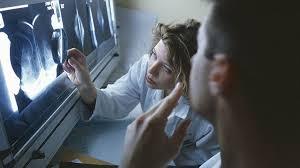
Cancer and Menopause: What You Need to Know
This article explores the relationship between menopause and two critical health concerns: breast cancer and cervical cancer. It explains the risks associated with breast cancer during menopause, including the impact of hormone replacement therapy and other contributing factors like lifestyle choices. The article also delves into the causes and prevention of cervical cancer, particularly the role of the human papillomavirus (HPV). It highlights the importance of early detection through national screening programs and emphasizes how Amira can support women in managing their health during menopause.
- Written by: Corentin Hugot
Breast Cancer and Menopause
Breast cancer is a malignant tumor that initially forms from breast cells. Today, one in eight women will develop breast cancer at some point in their lives.
This article focuses on the risk factors for breast cancer during menopause, the preventive measures you can take, and the screening methods available to you. It's important to note that most breast cancers have a good chance of being cured if diagnosed early! Mayo Clinic, one of our most trusted source has a good content about Breast cancer.
What is the Link Between Breast Cancer and Menopause?
The highest risk of developing breast cancer occurs between the ages of 50 and 74, which coincides with the typical age of menopause. However, menopause itself is not a direct cause of breast cancer, although the risk increases with age and the number of menstrual cycles a woman has experienced. This means that if a woman began puberty early or enters menopause late, her risk of breast cancer may be higher.
There is also much misinformation regarding the link between breast cancer and hormone replacement therapy (HRT) used during menopause. The HRT currently prescribed in France, which involves a combination of transdermal estrogen and micronized progesterone, slightly increases the risk of breast cancer. However, it primarily promotes the growth of an existing micro-cancer rather than causing new cancers. Therefore, HRT is typically only contraindicated for women with a personal history of breast cancer.
It's important to understand the link between hot flashes, menopause and hormones, you can found out more on our article.
Other Possible Causes
Age is definitely not the only factor that increases the risk of breast cancer. In fact, 75% of women who develop breast cancer have no identifiable risk factors.
A 2016 study by INSERM concluded that over half of the breast cancers that develop after menopause (53%) could have been prevented. These cancers are often linked to factors like a high body mass index, excessive alcohol consumption, smoking, or being underweight at the onset of puberty. Look at this government article about breast cancers after menopause too if you are interested.
Healthy Habits to Adopt
Here are some steps you can take to significantly reduce your risk:
- Reduce alcohol consumption: 8,700 cases of breast cancer per year are attributed to alcohol.
- Monitor your weight: 4,900 cases per year are linked to being overweight.
- Quit smoking: 2,600 cases per year are related to tobacco use.
- Eat a balanced diet: 2,500 cases per year are attributed to poor nutrition.
- Engage in regular physical activity: Aim for at least 30 minutes of walking per day if you do not participate in more vigorous exercise.
These habits can significantly impact the overall risk, given that around 60,000 cases of breast cancer are diagnosed annually in France.
Additionally, it is crucial to regularly monitor your breasts. It's recommended to visit your general practitioner or gynecologist once a year for a breast examination. You can also perform self-examinations by palpating your breasts in small circles with two fingers, covering the entire breast area and moving up to the armpit.
When to Consult a Doctor
You should consult a doctor if you notice:
- A lump or abnormal mass in the breast or underarm area. Regular self-examinations help distinguish between what is normal for you and what is not.
- Redness on the skin of your breast or an unusual "orange peel" appearance.
- Discharge from the nipple.
The National Breast Cancer Screening Program
To improve early detection, the French government has implemented a national screening program. The probability of curing breast cancer is around 90% if it is diagnosed early. Most breast cancers are hormone-dependent and benefit from well-established treatments.
There are also so-called "triple-negative" cancers, which do not have the usual receptors that allow for targeted treatments. These primarily affect younger women but are increasingly being treated more effectively. Therefore, diagnosing cancer early, especially at the age of menopause, is crucial.
Since 2006, women aged 50 to 74 in France have been invited every two years to visit an approved radiologist for a mammogram and clinical breast examination. This screening is fully covered by social security.
Unfortunately, only 50% of women in this age group participate in the program. However, this initiative has already reduced breast cancer mortality by nearly 20%.
Cervical Cancer and Menopause
Cervical cancer is the 12th most common cancer among women in France. The average age of diagnosis is 51 years. Although relatively rare, cervical cancer is closely monitored during gynecological consultations. Understanding its causes and prevention could be beneficial for you.
The Role of the Human Papillomavirus (HPV)
Cervical cancer is almost exclusively caused by a virus transmitted through sexual contact: the human papillomavirus (HPV). HPV is one of the few cancers that develop solely due to a viral infection. Approximately 80% of adults will contract HPV at some point in their lives. While the infection is common and usually not serious, it rarely leads to cancer. HPV is transmitted through sexual activity, even without penetration; skin-to-skin contact is sufficient to transmit the virus. Therefore, HPV can be spread through sex, fingers, or the mouth.
There are 200 different variants of HPV, but only two types (HPV 16 and 18) are responsible for the majority of cervical cancers. In total, only 12 variants are considered oncogenic.
Like all viruses, HPV enters cells, in this case, the cells of the cervix. It hijacks our cellular machinery to replicate its DNA and spread. Most of the time, our immune system is able to eliminate the virus. However, in some cases, especially with HPV types 16 and 18, the immune system cannot eradicate the virus, and the infection persists. If the virus persists, it can cause lesions on the cervical mucosa, known as precancerous lesions. This is a slow process.
Cervical Cancer
When precancerous lesions progress to affect the entire epithelium, they are classified as cancer.
Cervical cancer is divided into two stages:
-
In situ cancer: Abnormal cells have not crossed the basement membrane and remain confined to the epithelium. At this early stage, cancer can often be treated by removing the abnormal cells.
-
Invasive cancer: Abnormal cells have penetrated the epithelial membrane and invaded surrounding tissues. At this stage, the cancer can spread to other organs. If cancer cells enter the bloodstream or lymphatic system, they can form metastases in distant organs.
Prevention, Diagnosis, and Treatment
Each year, 3,000 women in France develop cervical cancer, and 1,000 die from it. As with all cancers, early diagnosis is crucial for effective treatment.
The well-known "Pap smear" is the primary method for detecting cervical cancer. This screening is fully covered by Social Security as part of the National Screening Program. During the exam, a healthcare professional uses a swab to collect cells from the cervical mucosa for analysis.
Screening Protocols Vary by Age
-
Under 30: The collected cells are primarily examined for inflammation caused by the virus.
-
Over 30: The test initially checks for the presence of the virus in the cells. If HPV is detected, a Pap smear is performed to analyze the cells for abnormalities. If HPV is not found, the test is repeated five years later.
Cervical cancer typically develops around 10 years after the initial HPV infection.
Pap smears are considered a "secondary" prevention method, aimed at early disease detection rather than preventing its occurrence. For HPV, France has also implemented a "primary" prevention strategy: vaccination! The vaccine is administered to young women at the onset of their sexual activity, between the ages of 11 and 18.
If HPV is not diagnosed in time and cancer develops, treatment may include chemotherapy, radiation therapy, or surgery, depending on the stage of the cancer.
How Amira Can Support Your Menopause Journey
As you navigate the complexities of menopause, it's essential to have access to reliable information and support. Amira offers personalized guidance and products designed to help women manage menopause more effectively. From expert advice on managing menopausal symptoms to understanding the risks associated with conditions like breast and cervical cancer, Amira is here to support you every step of the way. Explore our resources and take charge of your health during this crucial phase of life.
If you have any questions or need additional support, contact us—we're here to help.
Supported by Véronique Cayol, Gynecologist

Sleep Cool, Wake Refreshed
Terra’s smart cooling system stops hot flashes before they wake you.
Predicts & cools in seconds
No noise, no interruptions
Wake up refreshed





